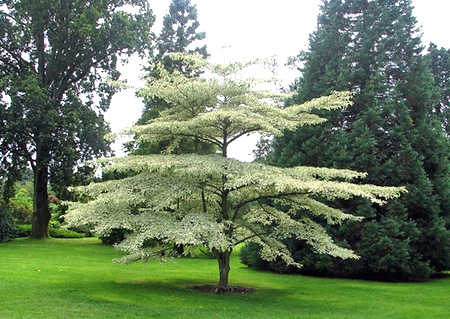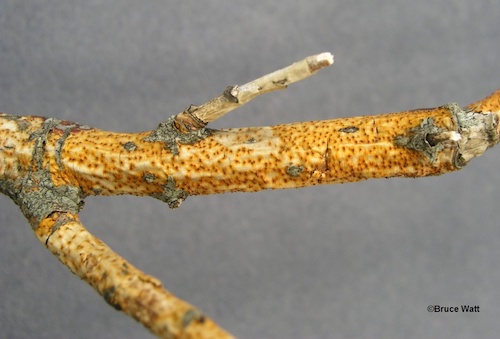This Dogwood is a ‘Best in Show’
by Kathleen Curthoys, Fairfax Master Gardener
When you behold the Pagoda Dogwood in the landscape, you can understand its curious name. The graceful sweep of horizontal branches, turning upward at the tips and arranging themselves in tiers, resembles the distinctive architectural form.

Pagoda Dogwood
Growing 15 to 25 feet tall (4 to 7 m) and wide, Cornus alternifolia is an understory tree good for smaller gardens, or any place where it can take center stage as a specimen feature. Pagoda Dogwood has captivating star power in all four seasons. In May and June, clusters of fragrant creamy white blooms balance on the ends of its twigs. By summer the leaves are dark green, and bluish-black fruit emerges on magenta-red stems. Its fruit and nectar attract birds, small mammals and butterflies such as the spring Azure butterfly. In autumn, the foliage changes to red or reddish purple. Its winter form is still a standout, and stems may be reddish brown.
Native to the eastern and central US, Pagoda Dogwood is right at home in Virginia. It tolerates deer and the presence of black walnut trees. Charmed yet? Gardeners in Northern Virginia may be when they learn Pagoda Dogwood can tolerate light to medium shade. Though it grows well in full sun, it will welcome cooling shade on hot days. It prefers agricultural zones up to Zone 7.

Pagoda Dogwood Flower
You can even say your Pagoda Dogwood has a distinctive feature. Its leaves grow in an alternate pattern on the branch. This is unusual since almost all other dogwoods have leaves growing opposite each other.
Pagoda Dogwood can be enjoyed as a specimen plant in your garden, in a shrub border or in naturalized areas. Pagoda Dogwood likes moist, well-drained soil that is acidic with a pH of 5.0 to 7.0. Not sure of your soil’s pH and other factors? A soil test will reveal that, as well as any nutrients that might be needed for gardening.
This tree has a shallow, spreading root system and would prefer not to be transplanted. Since the tree likes cooler conditions, keep the soil moist and mulch over the root area. This dogwood doesn’t tolerate drought well and may need to be watered in hot, dry weather to keep it healthy and resilient. It can be propagated by stem cuttings or grown from seed.

Golden canker
Plant Problems
The Pagoda Dogwood is considered to more resilient to diseases than some other dogwoods. But a common disease for this tree is golden canker, which is most visible when the trees are dormant and the leaves have fallen. When infected, the bark turns yellow or tan with orange bumps on the surface. Cankers appear at the tips of branches and can spread to branches, which may fail to produce leaves in spring. If the canker spreads on the branches in summer, the leaves may die off. If the trunk is affected, the tree may die. To treat golden canker, prune 4 to 6 inches below the yellow area on branches. After trimming, disinfect pruning tools. Burn or bury the infected branches.
This dogwood may be affected by anthracnose, leaf and flower blight (botrytis), crown canker, bacterial leaf scorch, powdery mildew and septoria leaf spot. Cornus alternifolia is relatively resistant to dogwood anthracnose, which is caused by Discula destructiva, a fungus that has affected the common dogwood Cornus florida in North America for decades.
Pagoda Dogwood may see dogwood borer, dogwood sawfly, Japanese maple scale, leafhoppers and oyster shell scale. Sunscald in hot, dry weather may be an issue. The tree may be susceptible to damage from wind, ice and salt. Watering the tree during times of drought will help keep it free of stress and therefore more resilient to disease.
Interesting varieties
Cultivars of Cornus alternifolia offer some colorful choices. The cultivar Cornus alternifolia ‘W. Stackman’ Golden Shadows has patterned foliage that resembles that of a variegated hosta. The leaves are red in spring, changing to light green in the center with yellowish edges. The leaves of ‘Argentea’ have green centers bounded by prominent white edges.
- Resources
- Cornus alternifolia, North Carolina State Extension Plant Toolbox
- Cornus alternifolia, Smithsonian Gardens
- Celebrate Dogwoods! Kousa and Pagoda Dogwood Trees, Fairfax County Master Gardeners video
- Golden canker of pagoda dogwood, Garret Beier and Michelle Grabowski, University of Minnesota Extension